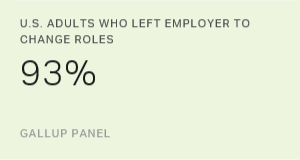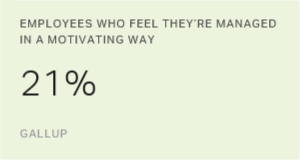Story Highlights
- Fewer than one in 10 who change jobs stay at the same company
- To retain employees, hiring the best is the first step
- Make ongoing career mobility conversations a priority
When Americans make a career move, they most often take a new position outside their organization, instead of one within it. The overwhelming majority -- 93% -- of U.S. adults say that the last time they changed roles, they left their employer to do so. Fewer than one in 10 (7%) say they took a new position within the same company.

Gallup found this to be true, whether the respondent said the job change took place 30 years earlier or within the past year. No matter how long ago in that time frame the change occurred, no more than 10% took a new job in the same company. And many didn't wait three decades to make a move: Roughly one in three (31%) say they changed jobs in the past three years.
This tendency for American workers to move out of an organization -- instead of changing roles within that organization -- poses significant problems for employers. An obvious one for many U.S. companies is turnover-related expense. It's tough to say precisely how much value an employer loses when a worker leaves, because factors such as job complexity and skill level must be factored in. Still, according to some estimates, it can cost up to 150% of the employee's annual salary for high-level employees -- for example, as much as $150,000 for a worker with an annual salary of $100,000.
Beyond the detriment to the bottom line, turnover can damage team dynamics because of the loss of group rapport or an employee's unique expertise and contributions. Teams must also shoulder the burden of extra work until a replacement can be trained. Further, losing talented, knowledgeable employees can be a drain on a company's leadership pipeline, and rampant attrition can also take a toll on an organization's carefully cultivated workplace culture.
Strategies to Keep the Best Employees
It's natural for employees to want to learn, grow and advance in their careers, and in many cases they shouldn't have to leave their organizations to do so. Based on Gallup's decades of workplace expertise, these strategies can help leaders in any industry buck the trend by selecting and retaining the best:
Hire the right people. When it comes to getting the best employees in your company, Gallup's science overwhelmingly supports a data-driven, talent-based approach. By working hard from the start to select individuals with the right talent for the role, organizations end up with workers who are the right fit for the company and the culture. These employees are more likely to become top performers who use their strengths every day at work. A scientific approach to selection may seem to cost more up front. However, often top talent more than pays for itself with increased productivity -- and it costs far less to find and retain great employees than it does to constantly replace mediocre ones.
Mold jobs to people, not people to jobs. Playing to employees' strengths is far more effective than trying to improve their weaknesses. When managers possess a deep understanding of employees' strengths, they are able to shape each individual's role to make the most of that person's talents. This feeds employee engagement and motivates employees to stay. Crafting jobs to maximize people's talents also builds stronger teams. By orchestrating each individual's strengths to fit the team's goals, leaders promote workgroup engagement and drive team performance.
Keep managers committed and accessible. After an organization invests time and money in hiring great people, it's in that organization's best interest to help them continue to grow. This means putting great managers in place to provide ongoing performance feedback and to position employees for ever-greater success. These managers must demonstrate to their employees that they care about them as individuals and about their personal goals. By making career mobility conversations a regular occurrence, managers can help employees stay on track with their aspirations and accommodate their goals. This will create a progressive culture -- one employees don't need to leave for a vocational refresh or to achieve their dreams. When workers feel comfortable talking with their managers and bringing them any type of question, they are significantly more likely to be engaged in their jobs and, therefore, more likely to remain with their company.

Regardless of an organization's industry or size, turnover is a challenge that leaders need to measure and manage. Fortunately, there are steps leaders can take to minimize the damage and keep their workforces strong. It benefits their organization not only to hire top talent, but also to adopt strategies and best practices designed to keep their high-performing workers around.
Sangeeta Agrawal contributed to the research in this article.
Survey Methods
Results are based on a Gallup Panel Web study completed by 13,510 national adults, aged 18 and older. The survey was conducted May 26-June 18, 2015. The Gallup Panel is a probability-based longitudinal panel of U.S. adults who are selected using random-digit-dial (RDD) phone interviews that cover landlines and cellphones. Address-based sampling methods are also used to recruit panel members. The Gallup Panel is not an opt-in panel and members are not given incentives for participating. For results based on this sample, one can say that the maximum margin of sampling error is ±1.3 percentage points at the 95% confidence level. Margins of error are higher for subsamples. In addition to sampling error, question wording and practical difficulties in conducting surveys can introduce error or bias into the findings of public opinion polls.
